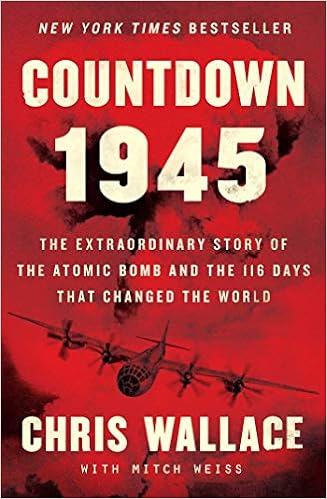
Dear Commons Community,
I have just finished reading Countdown 1945: The Extraordinary Story of the Atom Bomb and the 116 Days that Changed the World by news anchor, Chris Wallace with Mitch Weiss. It is a quick read mainly because the subject matter is so provocative. Anyone interested in history, particularly World War II, will finish its 270 plus pages in a few days. The last hundred pages are riveting and include detailed descriptions of President Harry Truman at the Potsdam Conference during which he is negotiating with Winston Churchill and Joseph Stalin. His main objective during this conference was to get Stalin to commit to declare war on Japan. During the conference, he is also keeping open his communications lines with his military advisers who are getting ready to test the first atomic bomb. The test is successful and plans for dropping the bomb on mainland Japan are discussed, debated and eventually approved. For every adviser who supports dropping the bomb, another is against it. Senior military personnel such as General Dwight Eisenhower preferred a land invasion of Japan rather than using such a destructive weapon that would result in an incredible loss of civilian lives. General Douglas Arthur felt that a land invasion of Japan would be “the greatest bloodletting in history” resulting in a loss of at least 250,000 to 500,000 American military lives. Later on, there is much debate about the consequences of having unleashed nuclear weapons upon humanity. Robert Oppenheimer, the main architect of the bomb regretted his decision to use it stating “I have blood on my hands.”
If you are not familiar with the details of the development and deployment of the first atom bomb, Wallace’s book is a good place to start.
A review that appeared in the New York Times Review of Books is below.
Tony
————————————————————
New York Times Review of Books
A Day-by-Day Re-Creation of Truman’s Decision to Use Nuclear Weapons
By Jay Winik
July 9, 2020
COUNTDOWN 1945
The Extraordinary Story of the Atomic Bomb and the 116 Days That Changed the World
By Chris Wallace with Mitch Weiss
On April 12, 1945, Franklin Roosevelt, beloved by the American people, was sick and depleted. Convalescing in Georgia after an exhausting summit with Winston Churchill and Joseph Stalin about ending the war and creating the peace to follow, he slumped in his chair, dead from a cerebral hemorrhage. He had tamed the Great Depression, lifted the hearts of Americans with his fireside chats, forged a remarkable Allied coalition and was victorious at D-Day. Now he was gone. Eighteen days later so was Hitler. All that remained for America was forcing Japan to surrender.
That job fell to the untested vice president, Harry S. Truman. “Salty,” “blunt” and “decisive,” Truman barely knew Roosevelt, and in the previous three months had met with him only twice (outside of cabinet meetings). Yet after being hurriedly sworn in as president, Truman was informed by Secretary of War Henry Stimson about an enormous top-secret program to develop a bomb of “unbelievable destructive power.” With “Countdown 1945,” Chris Wallace, son of the legendary newscaster Mike Wallace, and today one of the nation’s premier news anchors, tells the powerful story (assisted by the journalist Mitch Weiss) of the frenzied rush to develop the bomb before America’s adversaries did, and of the agonizing decision of whether to use it against Japan. It is a debate that haunts us to this day.
On one hand, the book reads like a riveting novel as Wallace reveals the machinations and internal debates among the scientific community to devise a workable atomic bomb as quickly as possible. We see Albert Einstein; we see Robert Oppenheimer; we see Enrico Fermi, each of whom played a role in developing the bomb, but then later came to regret the awesome power they helped unleash upon the world.
But “Countdown 1945” is also a profound story of decision making at the highest levels — and of pathos. The alternative to using the bombs would have been for a war-weary America to invade Japan. Yet as Wallace notes, the closer American troops got to Japan, the more “fanatical” the Japanese defenders became. American military planners feared that the war could go on not for months but for years, especially if a guerrilla war was carried out. And most estimates believed it would cost 500,000 or even a million American lives. Gen. Douglas MacArthur put it bluntly: An assault on Japan, he said, would be “the greatest bloodletting in history.”
“Countdown 1945” is filled with fascinating details. Truman referred to Stalin as a “little son of a bitch.” Little Boy, the atomic bomb dropped on Hiroshima, cost more than an aircraft carrier, and was likened to the stuff of sci-fi and even “Frankenstein.” The men of the flight crew carried cyanide pills with them, in case they somehow got caught by the Japanese. Incredibly, the bomb fell nearly six miles in 43 seconds; the explosion could be heard 50 miles away and the mushroom cloud was visible 400 miles away. As for the Japanese victims? “The fluid of their melted eyes” ran down their cheeks, and for one American crew member, “a lively city … disappeared before his eyes.”
In the end, the reader is forced to ask: Should Truman have dropped the bombs? Wallace points out that more than 100,000 people were part of the bomb-making effort, the program was approved by Roosevelt and over $2 billion was spent. “It is unrealistic,” Wallace says, “to think Harry Truman would make any other choice.” Truman himself exulted after the success of Little Boy, “This is the greatest thing in history.”
Was it? Wallace’s superb, masterly book lets the reader decide.


